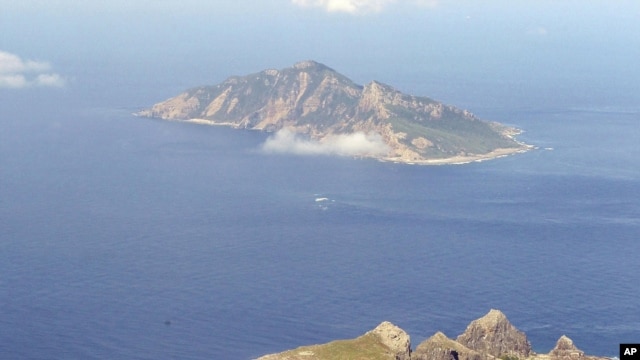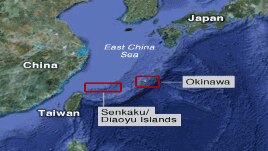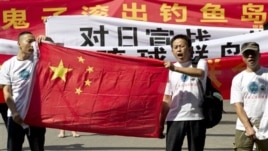Voice of America
Last updated on: September 12, 2012
Japanese patrol boats are circling a small group of islands in the
East China Sea, guarding against any encroachment by Chinese ships sent
by Beijing to invoke its claim of sovereignty over the islands.
Japan’s Asahi Shimbun reported Wednesday two vessels from China Marine Surveillance were at the border of Japan’s and China’s exclusive economic zones, but reported the Chinese ships were not moving toward the islands.
China's Xinhua state news agency said the deployment was based on an action plan drawn up to protect China's sovereignty.
“We’re nearing very dangerous territory in that sense because both countries are activating their patrol activities in the same areas," said Yoichiro Sato, director of the Japan-based International Strategic Studies at Ritsumeikan Asia Pacific University. "The possibility of accidental incidents between the two security forces is rising with these recent activities,” he said.
Tokyo annexed the eight-island chain it calls the Senkakus in 1895, and then re-acquired them from the United States in a post-WWII treaty. Beijing calls the island group Diaoyu, and claims it has been part of its territory since ancient times.
Both capitals have ratcheted up rhetoric over the islands in recent weeks and neither side has indicated willingness to compromise.
Nationalists have pressed for Japanese ownership, beginning with a move led by Tokyo’s Governor Shintaro Ishihara to raise enough money to buy the islands from a private Japanese owner.
On September 11, Tokyo ignored warnings by Beijing when it completed purchase of the Senkakus.
Geng Yansheng, a defense ministry spokesman, said on Tuesday "The Chinese government and armed forces stand firm and are unshakable in their determination to safeguard the nation's sovereignty and territory."
“There is a potential for conflict because when nationalisms are rife, as were seeing in both China and Japan, people begin to behave extremely irrationally and that's what we’re seeing,” said Jamie Metzl, senior fellow at the New York-based Asia Society.
“What needs to happen is a cooling off period followed by negotiations,” said Metzl. “But it's very difficult to have negotiations when certain countries, most particularly China, in effect are rejecting the principles of the UN Convention of the Law of the Sea.”
“If international law doesn't fully apply, then the question is what does apply and it tends to be the law of the jungle,” said Metzl.
Metzl doesn’t foresee a naval conflict between China and Japan. Most experts agree neither nation is likely to spill blood over a few uninhabited islands.
The dispute is evidence of what Metzl calls a new post-American era in the Asia-Pacific region.
“China is flexing its muscles to not only pressure other countries, but to test the relationship between some of these countries - particularly Japan and the United States,” said Metzl.
The United States’ position on the ownership of the islands is unclear, although it does refer to them as Senkaku.
In response to a question from a Japanese reporter this week, State Department spokesperson Victoria Nuland asserted the U.S. has no position on who owns the islands, but she did say Washington stands by the treaty under which they were returned to the Japanese in 1971.
But the United States does have mutual defense obligations to Japan, and if China does press its claims over the islands with force, Japan would expect the United States to honor its security commitments and come to its defense.
“The U.S. will have no choice because the credibility of the alliance, not only with Japan but with other allies, will be at stake at that point,” said Sako. “The US doesn't want to put itself into that kind of situation.”
Sato said what makes sense at this point is for the United States to deter China with a stronger verbal commitment to Japan.
Japan’s Asahi Shimbun reported Wednesday two vessels from China Marine Surveillance were at the border of Japan’s and China’s exclusive economic zones, but reported the Chinese ships were not moving toward the islands.
China's Xinhua state news agency said the deployment was based on an action plan drawn up to protect China's sovereignty.
“We’re nearing very dangerous territory in that sense because both countries are activating their patrol activities in the same areas," said Yoichiro Sato, director of the Japan-based International Strategic Studies at Ritsumeikan Asia Pacific University. "The possibility of accidental incidents between the two security forces is rising with these recent activities,” he said.
Tokyo annexed the eight-island chain it calls the Senkakus in 1895, and then re-acquired them from the United States in a post-WWII treaty. Beijing calls the island group Diaoyu, and claims it has been part of its territory since ancient times.
Both capitals have ratcheted up rhetoric over the islands in recent weeks and neither side has indicated willingness to compromise.
Nationalists have pressed for Japanese ownership, beginning with a move led by Tokyo’s Governor Shintaro Ishihara to raise enough money to buy the islands from a private Japanese owner.
On September 11, Tokyo ignored warnings by Beijing when it completed purchase of the Senkakus.
Geng Yansheng, a defense ministry spokesman, said on Tuesday "The Chinese government and armed forces stand firm and are unshakable in their determination to safeguard the nation's sovereignty and territory."
“There is a potential for conflict because when nationalisms are rife, as were seeing in both China and Japan, people begin to behave extremely irrationally and that's what we’re seeing,” said Jamie Metzl, senior fellow at the New York-based Asia Society.
“What needs to happen is a cooling off period followed by negotiations,” said Metzl. “But it's very difficult to have negotiations when certain countries, most particularly China, in effect are rejecting the principles of the UN Convention of the Law of the Sea.”
“If international law doesn't fully apply, then the question is what does apply and it tends to be the law of the jungle,” said Metzl.
Metzl doesn’t foresee a naval conflict between China and Japan. Most experts agree neither nation is likely to spill blood over a few uninhabited islands.
The dispute is evidence of what Metzl calls a new post-American era in the Asia-Pacific region.
“China is flexing its muscles to not only pressure other countries, but to test the relationship between some of these countries - particularly Japan and the United States,” said Metzl.
The United States’ position on the ownership of the islands is unclear, although it does refer to them as Senkaku.
In response to a question from a Japanese reporter this week, State Department spokesperson Victoria Nuland asserted the U.S. has no position on who owns the islands, but she did say Washington stands by the treaty under which they were returned to the Japanese in 1971.
But the United States does have mutual defense obligations to Japan, and if China does press its claims over the islands with force, Japan would expect the United States to honor its security commitments and come to its defense.
“The U.S. will have no choice because the credibility of the alliance, not only with Japan but with other allies, will be at stake at that point,” said Sako. “The US doesn't want to put itself into that kind of situation.”
Sato said what makes sense at this point is for the United States to deter China with a stronger verbal commitment to Japan.




1 comment:
US is instigating in South East Asia again...
Post a Comment